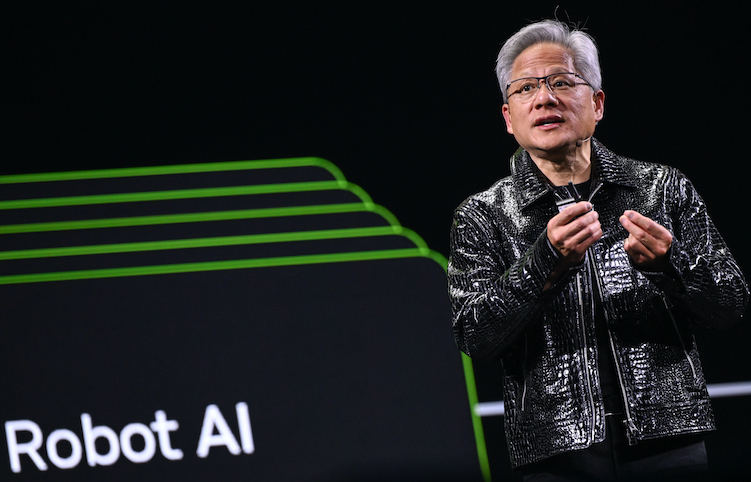Nvidia chief executive Jensen Huang has criticized the Biden Administration’s move to try to control the export of artificial intelligence chips to China as “a failure” – and welcomed the Trump Administration’s plan to modify the rules.
Speaking at a tech event in Taiwan on Wednesday, Huang said the Biden Administration’s AI diffusion rule, which divided the world into three tiers and sought to block exports of sophisticated AI chips to China, failed because the policy cost American companies billions of dollars in lost sales.
“All in all, the export control was a failure,” Huang said adding, “The fundamental assumptions that led to the AI diffusion rule in the beginning, in the first place, have been proven to be fundamentally flawed.”
ALSO SEE: Beijing Says Latest US Chip Warning Puts Trade Truce at Risk
The US block on sales of advanced AI chips forced companies in China to buy semiconductors from Chinese designers, such as Huawei. It also spurred China to invest aggressively to develop a supply chain that doesn’t rely on manufacturers outside the country.
The Nvidia chief executive said that despite the US controls, research continues, which requires vast sums of capital to acquire the necessary AI infrastructure.
At a press conference at the annual Computex event in Taipei, Huang praised Trump’s approach to AI and said by reversing the prior restrictions, the president demonstrated he understands that US companies are not the only providers of such technology.
“President Trump realises it’s exactly the wrong goal,” he said in reference to the prior rules.
From the start of US President Biden’s administration, Nvidia’s share of the Chinese market has dropped from 95% to 50%, Huang said.
Trump administration officials are weighing discarding the tiered approach to chip export curbs and replacing it with a global licensing regime with government-to-government agreements, which could give the US clout in trade talks.
‘Intense’ competition
More than half the world’s AI researchers are based in China and because of the US export controls on AI chips those experts have been forced to turn to local Chinese technology, Huang said.
“Our competition in China is really intense,” Huang said. “They would love for us never to go back to China.”
Huang estimated the entire AI market in China would be worth roughly $50 billion next year, which represented a significant opportunity for the company.
At the Computex event, Nvidia announced several new technologies and businesses that will expand its $130.5 billion revenue.
Curb on H20 chips cost us $15 billion: Huang
The company said in April it would take $5.5 billion in charges after the Trump administration limited exports of its H20 artificial intelligence chip to China, a key market for one of its most popular chips.
Earlier this week, Huang estimated that the H20-related revenue damage would amount to roughly $15 billion.
But Nvidia is working on a version of its current-generation Blackwell AI chip that will include a less speedy form of memory to comply with restrictions on the typical advanced memory included on AI chips, according to two sources familiar with the matter.
In 2022, the Biden administration effectively banned exports of advanced microchips and equipment to produce advanced chips by Chinese chipmakers, part of an effort to hobble China’s semiconductor industry and in turn the military.
After those controls were implemented, Nvidia began designing chips such as H20 that would come as close as possible to US limits.
There has been much debate about Biden’s export curbs and his push for significant chip production in the US, but some analysts say it may be too early to argue whether his export controls were an effective policy, given the intent was to hinder advances by the Chinese military.
One said Huang’s remarks could be intended to curry favour with the new president – and targeted at hawks within his administration who want to continue to impose curbs that limit China’s access to Nvidia’s advanced chips.
Meanwhile, China on Monday urged the United States to “immediately correct its wrongdoings” and stop “discriminatory” measures following US guidance warning companies not to use advanced computer chips from China, such as Huawei’s Ascend AI chips.
The US action seriously undermined the consensus reached at the high-level bilateral trade talks in Geneva, a statement from China’s commerce ministry said.
It vowed resolute measures if the US continues to “substantially” harm China’s interests.
- Reuters with additional input and editing by Jim Pollard
NOTE: Minor edits were made to the text on May 21, 2025.
ALSO SEE:
Nvidia to Build AI Supercomputer And New Office in Taiwan
Trump Unveils Huge Chip Deals in Gulf After Rejig of Export Rules
US Lawmakers Push Location-Tracking For High Powered AI Chips
Nvidia and China Tech Giants Hit by Latest US Chip Clampdown
Satellite Images Show Huawei’s Expanding Chip Facilities – FT
Rogue Communication Devices Found in Chinese Solar Inverters
Mass Layoffs Avoided in China, But Export Sector Badly Shaken
Fear of Huge Job Losses Led to China’s Move to Discuss Tariffs
Server Fraud Case in Singapore May be Linked to AI Chips, China
China’s Huawei, SMIC ‘to Ramp Up Production’ of Newest AI Chip
Huawei, SMIC Set to Defy US Sanctions With 5nm Chips: FT
























